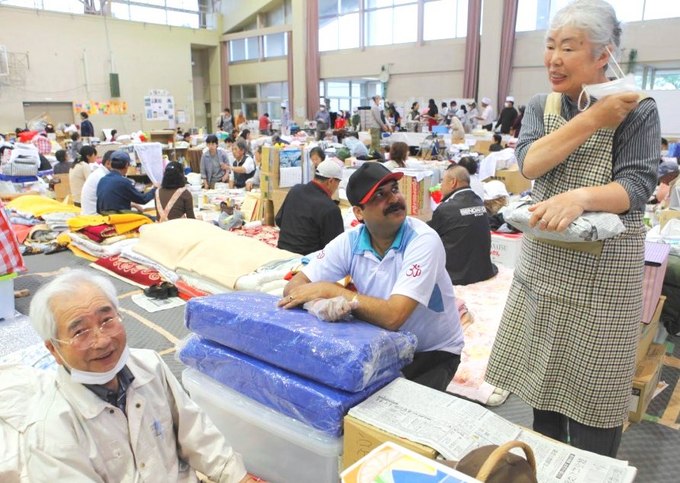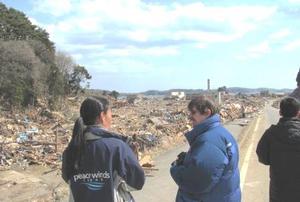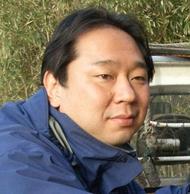Special Series: Connect with Tohoku--Real Voices 005
Importance of International Cooperation in Disaster ReliefKensuke Onishi
Peace Winds Japan CEO
Civic Force Representative Director

A member of Food For Life in volunteer activity. Photo by Mayumi Ishii.
Two and a half months have passed since the Great East Japan Earthquake, but in the affected areas, nearly 90,000 are still missing while more than 100,000 people are taking shelter. The construction of temporary housing and removal of rubble are progressing at a snail's pace, and the situation at the Fukushima Daiichi nuclear power plant has yet to be brought under control. Even though fishing has been partially resumed and shops are reopening, the speed of reconstruction is noticeably slower than after the Great Hanshin Earthquake of 1995 or any other disasters experienced in the past by Japan.

Left: Survivors of the earthquake perform radio calisthenics in an evacuation center. Photo by Mayumi Ishii.
The two organizations I represent, Civic Force (CF) and Peace Winds Japan (PWJ), started sending substantial amounts of relief supplies shortly after the disaster. I myself went to the affected areas many times, but I could not help but notice serious delays in the provision of food and other supplies, especially immediately after the disaster. As I have repeatedly pointed out, it is essential to set up a "control tower" which coordinates relief operations in a strategic manner, but I was reminded yet again of the absence of such an initiative.
Meanwhile, Japan is receiving an unprecedented scale of support from abroad. Cooperation with overseas groups is also vital for our organizations, and many of our activities target foreigners in disaster-struck areas. For instance, CF has formed a partnership with other NPOs to utilize each group's strengths in relief operations. Among the partners is the Japan Association for Refugees (JAR), which has set up a volunteer group consisting of Japanese and refugees living in Japan. They are clearing away mud in the disaster areas; and in the soup kitchens, they are serving menus from the refugees' home countries. JAR is utilizing its know-how amassed through its normal operations to help foreign victims, providing vital lifeline information in multiple languages and offering the support of social workers and legal experts to those who need help. I believe such activities will be long remembered by the people who received support and they will further deepen mutual understanding.
 PWJ, for its part, has engaged in partnerships with American NPOs. For instance, PWJ and Mercy Corps (MC), based on their experience of joint activities around the world, have set up a field operation team, which began with situation surveys and went on to provide medium to long range-support for children's mental care and the rebuilding of local industries. MC plans to contribute several hundred billion yen collected from donors in the U.S. Another partner is the Dougy Center, which is known worldwide for its care of orphans and families who have lost precious members. The skillful handling of disaster relief from overseas has always been a major concern of mine, but I think our recent experience will prove to be helpful in future activities.
PWJ, for its part, has engaged in partnerships with American NPOs. For instance, PWJ and Mercy Corps (MC), based on their experience of joint activities around the world, have set up a field operation team, which began with situation surveys and went on to provide medium to long range-support for children's mental care and the rebuilding of local industries. MC plans to contribute several hundred billion yen collected from donors in the U.S. Another partner is the Dougy Center, which is known worldwide for its care of orphans and families who have lost precious members. The skillful handling of disaster relief from overseas has always been a major concern of mine, but I think our recent experience will prove to be helpful in future activities.
I believe international cooperation in disaster relief will become more and more important. In the Asia-Pacific region, where natural disasters are frequent, CF has been trying to set the stage for businesses, NGOs, and governments from many countries to work together. I hope our activities after the recent earthquake will help accelerate the effort.
Peace Winds Japan, an International NGO
Relief operations carried out by Civic Force, a Public Interest Incorporated Association
 Kensuke Onishi
Kensuke Onishi
Born in Osaka in 1967, Onishi studied journalism at Sophia University, before receiving an M.A. in International Politics and Security Studies from the Department of Peace Studies at Bradford University in the U.K. He founded Peace Winds Japan in 1996; it has engaged in relief operations around the world including in Iraq and Afghanistan. Since 2000, Onishi has served as a director and council member of Japan Platform, a joint humanitarian aid organization of NGOs, the government, and private corporations. He has been the CEO of PWJ since 2008, and is the chairman of Civic Force, a public interest incorporated association dedicated to disaster relief, since 2009. Since 2010, he has been a member of the Japanese government's New Public Commons Roundtable, as well as the author of NGO, Jozai Senjo (Readiness for Battle) and other books.
Back Issues
- 2019.8. 6 Unraveling the Maker…
- 2018.8.30 Japanese Photography…
- 2017.6.19 Speaking of Soseki 1…
- 2017.4.12 Singing the Twilight…
- 2016.11. 1 Poetry? In Postwar J…
- 2016.7.29 The New Generation o…
- 2016.4.14 Pondering "Revitaliz…
- 2016.1.25 The Style of East As…
- 2015.9.30 Anime as (Particular…
- 2015.9. 1 The Return of a Chin…

